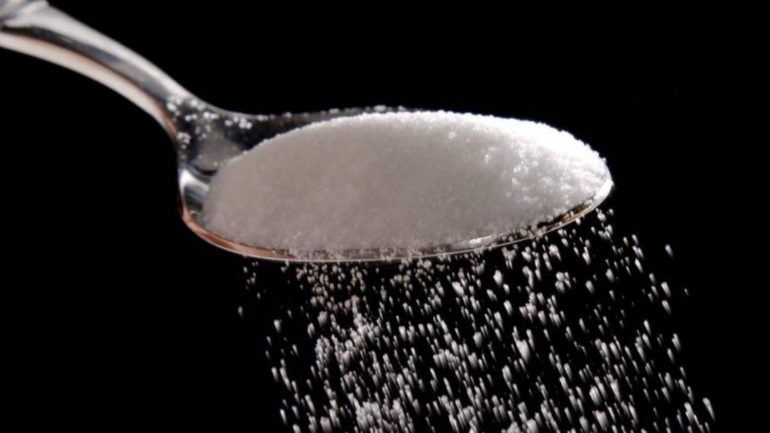
A large spoon of sugar. (Matt Rourke/The Associated Press)
Son Ha Tran
Health Canada is going to cut the fat out.
It has issued a Notice of Proposal, citing its intention of suspending in September the use of trans fat in the food industry, a major of source of health problems.
The government’s move will place the partially hydrogenated oils (PHOs) to the List of Contaminants and Other Adulterating Substances in Foods.
But some nutritionists and dietitians say the government should go further. The excessive use of added sugar in Canadians’ diets should not be part of Health Canada’s menu for a healthy diet.
“Addressing trans fat, which is one substance that has detrimental health consequences when consuming excessively,” said Rachel Prowse, an applied public health science specialist in healthy eating at Public Health Ontario and dietician. “But it’s just one approach to promote the healthy diet.
“Multiple approaches are needed to promote lots of different healthy eating behaviours,” she said. “There are multiple things contributing to poor diet, trans fat is one, too much sugar would be another.”
Prowse emphasized consuming sugary beverages of Canadians is spoiling their healthy diet.
“Added sugar has two different ways to affect our health, and most of the research come through looking at sugary drink,” she said. “When we drink sugary products, they don’t always account for how many calories are in it, we end up consuming too many calories, and that makes our weight gain.”
One nutritionist said some of the products that have a large amount of added sugar are low in nutritive values.
“Someone who gets a lot of calories from ice-cream, candies, cookies, obviously, it’s not helpful,” said Andy De Santis, a registered dietitian in Toronto. “Those foods don’t do anything for us from the nutritional perspective.”
De Santis said many types of junk food contain so many of calories and is contributing to the growth of obesity in Canada.
“If you are eating too much processed food, and you don’t have enough space in your diet for healthy food, that’s going to be a problem,” De Santis said.
Prowse said sugar also affects the way the body functions, affecting how well the liver works, contributes to diabetes, changes of level of cholesterol, and causes cardiovascular diseases.
WHO recommended in a 2014 report that sugars should make up less than 10 per cent of total energy intake per day. The recommendation also suggests reducing sugar consumption to less than five per cent would be better.
Prowse suggest people study every label on a product to determine the amount of sugar it contains. Eliminating or reducing them would cut sugar intake, she said.
“You can look at nutrition fact table on the product to choose whether or not should you pick it up in a supermarket,” Prowse said. “Two-thirds of packaged food products in Canada do indicate how much of added sugar is in them.”
De Santis said not all the sugars are bad for people and it depends much on how each individual consume in their diets.
“Many people are afraid of eating fruits because of there’s sugar in it, but this perception is wrong,” he said. “Most of the fruits consist of many essential nutrients and vitamins.”
De Santis said added sugar is now more a concern than trans fat in terms of damaging effects to public health.
“I don’t think right now trans fat is a relevant public health concern,” he said. “In the past, it was, but now food is not allowed to have a large amount of trans fat.
“Added sugar is more dangerous, you might not easily find a product which has an excessive amount of trans fat now,” De Santis said. “Junk food with 300, 400 calories is everywhere.”

